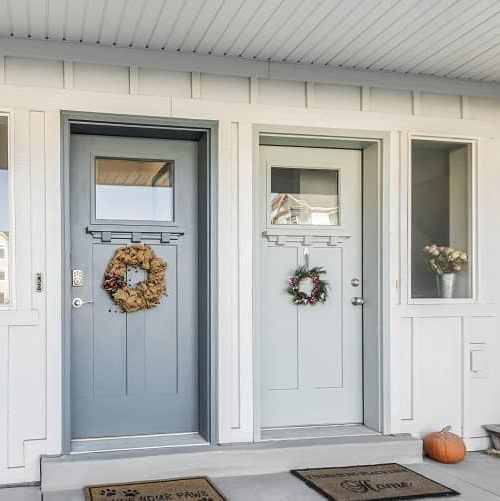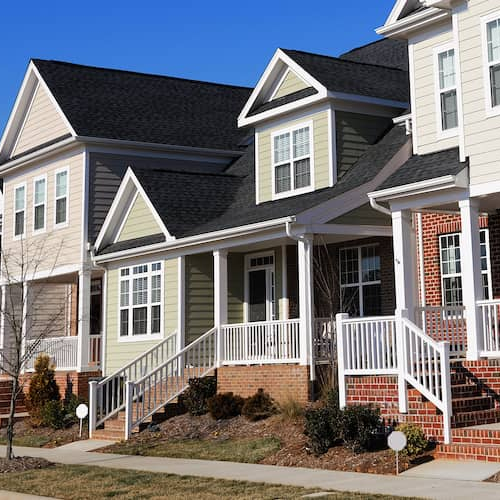FHA multifamily loans: A complete guide
Contributed by Sarah Henseler
Dec 10, 2025
•5-minute read

You’re looking at earning some rental income and are considering buying a multifamily home, perhaps living in one unit while you rent out the others. You can consider a FHA multifamily loan. This government-backed loan offers first-time home buyers the opportunity to purchase a home up to four units.
Understanding these types of loans, including eligibility requirements and who they’re best suited for, will help you determine whether it’s the right loan for you.
What is an FHA multifamily loan?
The Federal Housing Association (FHA) loan program was created to help create a more accessible path to becoming a homeowner. Since Congress created the program in 1934, more than 50 million homeowners have taken advantage of the FHA loan program.
FHA loans allow you to purchase a multifamily home anywhere from one to four units. That means you can use the loan to buy a single-family home with up to four separate units. However, one of the requirements is that the home needs to be your primary residence.
If you’re not interested in occupying one of the units or want to purchase a property with five or more units, you’ll need to consider special HUD commercial loan options, which many conventional lenders like Rocket Mortgage® currently don't offer.
What are the FHA multifamily loan requirements?
Eligibility for FHA multifamily loans include meeting owner occupancy, loan limit, and minimum credit requirements.
Owner occupancy
It’s not possible to use an FHA loan for investment purposes because you need to occupy the investment property as your primary residence. More specifically, you need to live in the home for at least 1 year. You will also need to move into the home within 60 days after the home closing date.
Maximum loan limits
Loan limits for FHA loans depend on factors like your location and the number of units you want to purchase.
These limits are based on a percentage of national conforming loan limits that are set by the Federal Housing Finance Agency (FHFA). The lowest is typically at 65% of the conforming loan limit, and the maximum is at 150%.
| Units | Low-cost counties | High-cost counties | Special exception areas |
|---|---|---|---|
| 2 | $693,050 | $1,599,375 | $2,399,050 |
| 3 | $837,700 | $1,933,200 | $2,899,800 |
| 4 | $1,041,125 | $2,402,625 | $3,603,925 |
Income
While FHA loans don’t have a specific income requirement, you will most likely need to prove to lenders that you have the means to pay back the loan. It could be from your W2 job or steady income sources from self-employment.
When it comes to multifamily mortgages, you can include the potential income you’ll generate from your other units. Properties that have three to four units, for example, will need to generate income above your mortgage payment, or what’s referred to as Net Self-Sufficiency Rental Income. This amount is the 25% of the fair market rent from all the units, or the fair market rent subtracted by necessary expenses.
Credit score
The minimum credit score needed to qualify for an FHA loan is technically 500, but many lenders, including Rocket Mortgage, require 580.
Even if you do find a lender that has a 500 minimum credit score requirement, you’ll need to consider the costs associated with the loan. If you qualify, you’ll need to put a 10% down payment. With a 580 credit score, however, you’ll only need to put down 3.5%.
Because of the lower down payment requirements, you may want to consider checking your credit score. Boosting a lower score could come with other benefits like the ability to qualify for lower interest rates.
Debt-to-income ratio
Your debt-to-income ratio is the percentage of your gross income that goes toward debts. Lenders use both front- and back-end ratios to determine your eligibility for a loan. The exact percentage depends on your credit score.
The front-end debt-to-income ratio is the expected housing expenses divided by your gross income. Lenders usually want to see a front-end DTI around 31% to 40% for FHA multifamily mortgages. So if your household gross monthly income is $11,000, then you can afford to take on a $3,410 to $4,400 monthly mortgage payment. You may find lenders willing to be more lenient with their front-end ratio.
When it comes to the back-end ratio, the difference is that it includes all your debt payments. Lenders tend to want your back-end ratio to be anywhere from 43% to 50%. For example, using the above gross income, your back-end ratio can’t be more than $4,630 to $5,500 in debt payments, including your mortgage.
You can work on improving your DTI by continuing to lower your debt or increasing your income.
Appraisal
The purpose of a home appraisal is to ensure that the home is safe enough to occupy and to assess its fair market value. Appraisers will use Form 1025 to assess multifamily homes.
You don’t need to be present for the appraisal, but you should be able to see a report once it’s complete.
The pros and cons of FHA multifamily loans
Like with other types of home loans, there are advantages and disadvantages with FHA multifamily loans.
Pros
- More lenient requirements: Compared to conventional mortgages, FHA loans tend to have lower credit score requirements, and allow higher DTIs for their borrowers.
- Supports different property types: You can choose from different homes when using an FHA loan.
- Lower finance requirements: You can make a down payment on a home for as low as 3.5% depending on your credit score.
- Ability to include a renovation loan: If you purchase a multifamily home that needs significant repairs, you can also take out an FHA 203(k) renovation loan and make one mortgage payment.
- Can “house hack” using FHA loan as a tool: House hacking is where you earn income from your primary residence, helping to offset your housing costs. In this case, you earn rental income from the other units you rent out.
Cons
- Need to meet owner occupancy rules: You need to live in one of the units as a primary residence, so real estate investors who want to live elsewhere won’t be eligible for an FHA loan.
- Mortgage insurance premiums: Borrowers will need to pay for mortgage insurance, an upfront charge and an ongoing annual one. The up-front mortgage insurance premium is 1.75% of the loan amount, and the annual one is from 0.8% to 0.85%.
- Limit on units allowed: You’re limited to purchasing a multifamily home of up to four units, which can be limiting if you want more.
Alternatives for financing a multifamily property
FHA multifamily loans aren’t your only option. You can choose from a whole host of other alternatives.
Other FHA-backed HUD loans
The U.S. Department of Housing and Urban Development (HUD) offers other programs to help borrowers purchase other types of housing like affordable housing rental units, co-op housing, and more. Each has its own eligibility criteria, including submitting documentation that there is demand for rental housing in the area.
Rocket Mortgage doesn’t currently offer these loans.
Conventional mortgages
Conventional mortgages aren’t guaranteed or backed by the government and may be more cost-effective if you can qualify for more competitive rates and terms.
However, they may be harder to qualify for compared to government backed loans. For example, minimum credit score requirements may be higher, and lenders may require a lower DTI compared to FHA loans.
Each lender will have its own requirements and eligibility criteria, including the number of units you can purchase and loan limits.
You may be able to purchase an investment property without having it to be your primary residence, but you may need to meet additional requirements. For example, Rocky Mortgage doesn’t offer conventional mortgages for five or more units.
Traditional commercial mortgages
It’s possible to take out a commercial mortgage to purchase a multiunit property if you don’t plan on living in the property. Like conventional loans, these mortgages may be harder to qualify compared to FHA loan criteria.
You will also most likely have to submit additional documentation showing that the property can generate income that can exceed the mortgage payments.
Currently, Rocket Mortgage doesn’t offer commercial mortgages.
The bottom line: An FHA multifamily loan can be a great option for owner-occupiers
If you’re looking to purchase a multifamily home and plan on living there, an FHA multifamily loan can be a great option. Lender requirements are less stringent compared to other loan options, like the ability to qualify with a lower credit score.
Before moving ahead with any purchase, it’s important to assess whether the home qualifies for an FHA multifamily mortgage and whether the loan is the best choice for your needs.
If so, you can start the loan process with Rocket Mortgage today.
To qualify for this offer, you must meet all standard FHA eligibility requirements. In addition, your total mortgage payment, including taxes and insurance, cannot exceed 38% of your income, your debt-to-income (DTI) ratio cannot exceed 45%, and you must have 12 months of verifiable housing history immediately prior to your application, no late payments 30 days or greater in the last 12-months, and no derogatory marks on your credit report. Not available on jumbo loans. Asset statements may be needed, no more than 1 day of non-sufficient fund fees are allowed in the most recent 2 months prior to application. Additional restrictions/conditions may apply.
Rocket Mortgage is not acting on behalf of FHA or HUD.

Sarah Li Cain
Sarah Li Cain is a freelance personal finance, credit and real estate writer who works with Fintech startups and Fortune 500 financial services companies to educate consumers through her writing. She’s also a candidate for the Accredited Financial Counselor designation and the host of Beyond The Dollar, where she and her guests have deep and honest conversations on how money affects our well-being.
Related resources

8-minute read
Duplex vs. townhouse: What’s the difference?
A duplex shares one wall, while a townhome usually shares two. Find all the differences between duplexes and townhouses and see which style seems best for you.
Read more
7-minute read
Financing multiple rental properties: A beginner's guide
Looking to invest in real estate but not sure how to secure financing for multiple rental properties? Here’s everything you need to know.
Read more
9-minute read
Investment property loans: What are they and what are your options?
Considering buying an investment property? Learn what an investment property is, the types of properties you can invest in and how to get financing through a lo...
Read more